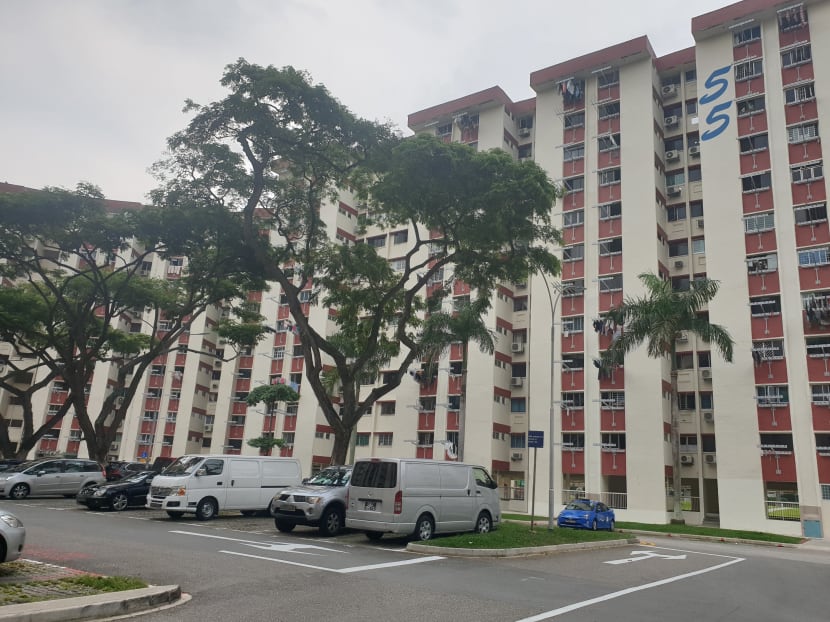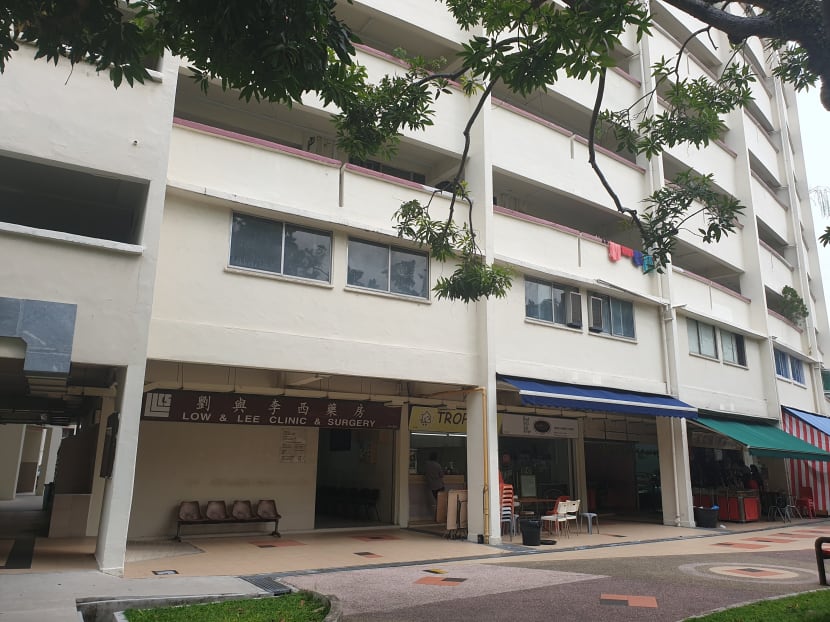Singapore’s worst dengue hotspot: Some residents unfazed, others taking precautions
SINGAPORE — Nineteen-year-old Chen En Yu came down with a fever of 40°C in March after one of her frequent visits to her uncle’s home in Block 55 along Chai Chee Drive. The public housing block is the worst dengue hotspot in Singapore, going by official figures.

Block 55 on Chai Chee Drive looks unremarkable but is the venue of the worst outbreak of dengue fever across the island.
SINGAPORE — Nineteen-year-old Chen En Yu came down with a fever of 40°C in March after one of her frequent visits to her uncle’s home in Block 55 along Chai Chee Drive. The public housing block is the worst dengue hotspot in Singapore, going by official figures.
The polytechnic student, who also suffered from vomiting, was later hospitalised for three days after learning she had contracted the viral disease.
The teenager lives in the Bedok Reservoir area. She said her uncle had also contracted dengue fever around the same time as she did.
Speaking to TODAY at her uncle’s home on Wednesday (July 3), En Yu said that officers from the National Environment Agency (NEA) later visited her uncle’s home to conduct checks for mosquito breeding.
While the episode has not deterred her from visiting his place, En Yu said that she and her uncle have installed mosquito nets in the windows around his house to keep out mosquitoes.
NO CHANGE TO LIFESTYLE
Their efforts stand in contrast to the owner of a fruit stall at the block, who contracted dengue more recently. The owner, who wished to be known only as Mr Ong, was hospitalised for nine days in May after he was diagnosed with the condition.
The 66-year-old told TODAY: "I could not walk or even stand. I had a very bad fever and no energy to eat or move, so my friend called an ambulance for me."
He added that he was unable to run the fruit stall for nearly three weeks.
Despite the illness, Mr Ong said that he has made no changes to his lifestyle since recovering.
Some residents interviewed by TODAY were aware and concerned that their block was home to the largest number of residents affected by dengue this year, but others said that it was “business as usual” for them.

Some residents from Block 55, Chai Chee Drive, are taking precautions such as using mosquito nets, and ensuring thatthere are no stagnant pools of water where mosquitoes could breed. Photo: Navene Elangovan
Statistics published on NEA’s website showed that 54 residents of the block have contracted dengue this year. It is part of the fourth-largest cluster of dengue in Singapore, covering Chai Chee Avenue, Chai Chee Drive, Chai Chee Lane, Chai Chee Road and Chai Chee Street.
A total of 117 cases have been reported since the cluster emerged in April.
When TODAY visited Block 55 on Wednesday afternoon, banners were prominently placed around the estate to indicate the number of dengue cases in the cluster.
The outbreak at Block 55 is part of a wider serious outbreak, with more than 6,200 dengue cases across the island — more than the last two years combined. The virus has also claimed five lives so far, equal to the total death count in 2018 alone.
Some residents of Block 55, such as those with children, are aware that they are living in a dengue hotspot and have taken precautions.
UNAWARE BLOCK HAS MOST DENGUE CASES
Mrs Geetha, a 34-year-old housewife who wanted to be known only by her first name, was unaware that her block is home to the highest number of dengue cases in Singapore, and said that it was “scary” when informed by TODAY.
She nonetheless knew that she is living in a dengue hotspot and has stopped her two children, aged 11 and eight, from going to the playground, after observing a rise in dengue cases since May.
She added that she has stopped watering her plants to reduce the possibility of mosquito breeding sites and kept the windows closed after 7pm to prevent any mosquitoes from entering the flat.
Another resident, who identified herself as Ms Rohani, said that she is worried about the high number of cases in the block, and is particularly concerned for young children and senior citizens in the neighbourhood.
The 45-year-old, who is unemployed, said that NEA officers had conducted checks on her home four to five times over the last two months. She had also taken steps to reduce potential mosquito breeding sites by closing the cover of the toilet bowls when she was out of the home, for example.
However, it is “life as usual” for several other residents of the block.
Mrs Pushpa Dinesh, who has been living in Block 55 for the past two months, is aware that her block had the highest number of dengue cases in Singapore.
DOING THEIR PART IN PREVENTION
However, the 62-year-old housewife is expecting the dengue situation to “blow over” soon. She is also not worried that she, or the four other members of her household, would contract dengue, as she is doing her part to ensure there is no stagnant water in her home.
Similarly, 80-year-old retiree Mr Chong Chock Leong, who has lived in the block for 30 years, appeared unperturbed when told of his block’s unwanted status, saying that contracting the virus was simply a matter of chance.
Mrs Sathiyapriya Alagumanikadan, owner of A1 Grocery & Mini Mart located on the ground level of Block 55 and a resident of the block, is concerned about the high number of cases at the block. However, she is not worried about her own family contracting dengue.
All nine residents who spoke to TODAY said that NEA officers had conducted checks in their homes and around the areas within the last two months, and had shared tips to prevent mosquito breeding.
TOWN COUNCIL INTENSIFIES CONTROL OPERATIONS
Mr Tan Chuan-Jin, Member of Parliament for Marine Parade Group Representation Constituency who looks after the Kembangan-Chai Chee ward, said the town council is working closely with the NEA to obtain the latest information and control the dengue situation within the estate.
The town council had intensified its vector control operations and cleaning operations on the ground, including checking and destroying potential breeding grounds in common areas and mitigating the causes of stagnant water wherever possible.
“For Block 55 and areas of interest, these steps are intensified. Block 55 clearly would be the most intensive given the (current) situation,” said Mr Tan, who is also the Speaker of Parliament.
He added that he did not think there is a specific reason as to why some areas, such as Chai Chee, are dengue hotspots. He attributed it to various factors such as the humid and warm weather, which could shorten the breeding cycles of mosquitoes.
While residents had stepped up their efforts to eradicate mosquito breeding sites, Mr Tan said that it would be hard to ensure a “zero” case scenario.
"The situation is slowly improving but we are not out of the woods yet. We need to continue to keep up these efforts," he added. ADDITIONAL REPORTING BY KIMBERLY LIM











